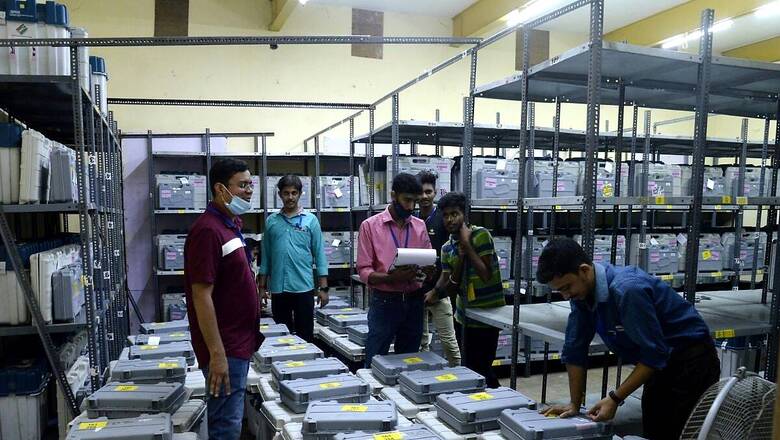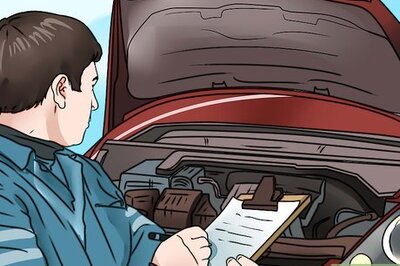
views
Talk on ‘One Nation, One Poll’ is gaining momentum again after the Union government formed a committee to explore the feasibility of holding simultaneous Lok Sabha and state assembly elections across the country.
News18 spoke to the former heads of the Election Commission of India who believe that it is not easy to hold simultaneous elections across India and even if it is decided, it cannot be done in 2024.
The topic resurfaces every now and then and several studies have already been conducted on it. In July, the government informed the Rajya Sabha that the issue has been referred to the Law Commission to work out a practicable roadmap and framework. Government think tank NITI Aayog has already backed the idea that was a practice in India until 1967.
Speaking to News18, Manohar Singh Gill, who served as the CEC for six years from 1996, said holding simultaneous Lok Sabha and state assembly elections is not possible as the Constitution does not allow it. He explained that states have elections and terms on different dates and months and it is not feasible to bring all on the same page.
“If it is to be done, the Constitution has to change. It is very difficult. Parties talk about it for political benefits.”
He explained that states are very independent in India, unlike many other countries. “It is difficult to bring leaders together who are working independently. States have different views on different topics. It can’t be done and it should not be done. India is many countries in one passport. Punjab is different and so is West Bengal and so is Tamil Nadu. Same is for Odisha, Maharashtra and other states,” he said.
He said it will not be possible to hold elections together as different states have different election phases and terms.
“All states have their own system. Those at the Centre have power to dissolve the Lok Sabha. They cannot dissolve any assemblies be it Punjab or Haryana. How can they do it?” he asked.
While former Chief Election Commissioner SY Quraishi had a slightly different view, he was sure that simultaneous Lok Sabha and state assembly elections cannot be held in 2024.
“Right now, the electronic voting machines are recycled between elections. The same machines are used in Lok Sabha as well as state elections. But if all elections are happening at the same time, we need three times the machines. This will require some time to manufacture. In the 2024 election, it is not possible,” he told News18.
He went on to say that at least two-three years will be needed for preparations.
Quraishi, who headed the poll body between 2010 and 2012, said holding elections together will be the most convenient thing not just for the Election Commission but for all.
“Voter is the same, polling station is the same, election machinery is the same and the security apparatus is the same. So when you as a voter go to the polling station, instead of pressing one machine at a time, there are three machines for three tiers and you press them all and you are free for five years,” he said.
He believes that the committee will consider all the stakeholders and will take the decision accordingly.
Another former ECI head, who did not wish to be named, added that it will not be practical to hold elections simultaneously as had happened earlier.
“India was holding simultaneous elections between 1951 and 1967. But why did it change? Because some assemblies were dissolved earlier or in some states clear majority could not be achieved. So eventually, as and when needed, states went for polls again. They cannot wait for more than six months. The same situation happened in the Lok Sabha as well. There were times when states were managing fine but no party got a clear mandate at the Centre. How can we control that in future?”
The former CEC went on to say that even if all the states and parties agree, “which is very rare”, and we have an election in January, “what are the chances that all the states and Lok Sabha will get a clear majority? Who will ensure that all the states and Lok Sabha will run the government for the next five years without failing? What will happen if any of the states or Centre fail to run the government for five years?”
However, they also said while it will help in saving money for both political parties and the government, a clear roadmap is necessary.
Long Process Ahead
For holding elections together, at least five articles need to be amended. These are Article 83 about the duration of Houses of Parliament; Article 85 about the dissolution of the House of the People by the President; Article 172 about the duration of the State Legislatures; Article 174 about the dissolution of the State Legislatures; and Article 356 about the imposition of President’s Rule in states.
Another hurdle, as highlighted by Quraishi, will be the requirement of additional EVMs/VVPATs. This could cost a huge amount.
The life of these machines is only 15 years and so each machine could only be used for about three or four times in its life span. Further, after every 15 years, they will be replaced and that will again cost a huge amount.
While these are some of the topics that the committee will discuss, it is being expected that the Centre may raise the issue in the Special Session of Parliament later this month.




















Comments
0 comment